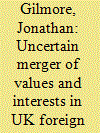| Srl | Item |
| 1 |
ID:
104023


|
|
|
|
|
| Publication |
2011.
|
| Summary/Abstract |
he current US counterinsurgency approach, introduced in 2006, has been highlighted as representing a significant shift in the US military's approach to operations in Iraq and Afghanistan. Restraint in the use of force, a focus on development projects and increased awareness of local cultures might be interpreted as signalling the emergence of a more reflective and empathetic US military, with greater acceptance of human security principles. This article contests such an interpretation, arguing that US counterinsurgency contains a range of characteristics that render it an unsuitable tool for addressing the underlying social and political problems of Iraq or Afghanistan, as well as an inappropriate platform for the realization of human security principles. Counterinsurgency retains a significant role for high-impact war-fighting, remains firmly embedded within the narrative of the War on Terror, and is likely to lead to the disempowerment of local populations. Taken together, these interlinked characteristics make the US counterinsurgency model an unlikely vehicle for the development of a long-term positive peace in the societies within which it is being applied and risks seriously compromising the credibility of future attempts to help protect the security and well-being of individuals and groups beyond one's own national borders.
|
|
|
|
|
|
|
|
|
|
|
|
|
|
|
|
| 2 |
ID:
131438


|
|
|
|
|
| Publication |
2014.
|
| Summary/Abstract |
How should ethics and values relate to the British national interest? The idea that ethical commitments to distant non-citizens should occupy a position within British foreign policy was a controversial element of Labour's foreign policy during the early part of their 1997-2010 tenure. Rather than undermining traditional national interest concerns, one of the defining themes within Labour's foreign policy was that values and national interests were becoming increasingly merged in a globalized world. The post-2010 coalition government has made distinct efforts to differentiate themselves from their predecessors, crafting a more pragmatic and national interest-based foreign policy approach. Despite this, significant continuities with Labour's 'ethical dimension' are evident and many associated policies and practices have survived the transition. Moreover, the suggestion that British values and interests are interrelated and mutually reinforcing has been re-asserted, with renewed vigour, by coalition policy-makers. The article traces the ways in which values and interests have become increasingly merged in the language of recent British foreign policy and examines the implications for our understanding of the UK's national interest. It argues that the idea of an almost symbiotic relationship between values and interests is fundamentally unhelpful and makes the case for greater disaggregation of the two. Although a zero-sum game need not exist between core national interests and ethical obligations abroad, the suggestion that they are mutually reinforcing obscures the tensions that frequently arise between these different realms of obligation. Using the examples of failed state stabilization and UK arms trade regulation, the article demonstrates how uncritical acceptance of the values-interests merger risks producing unstable policy formulations.
|
|
|
|
|
|
|
|
|
|
|
|
|
|
|
|